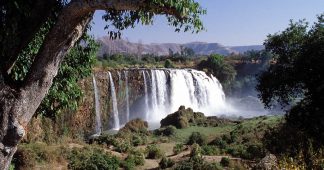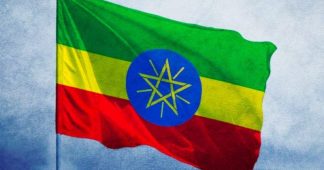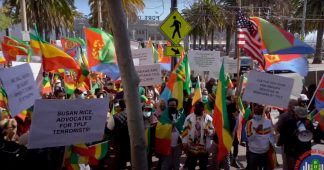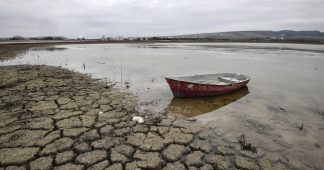A Message from the Popular Front for the Preservation of the River Nile (Egypt) to the Arab, African and international parties, movements, forces and organizations
Because we believe in the strong human ties shared by all human beings all over the world, and between those who represented by departments, parties, forces, and organizations that seek to preserve the environment, climate and land, and defend the right of human beings in them, and to live in justice and peace; we address to you this message and we will send you a file of technical studies and Scientific Reports on the subject.
Given the grave danger posed by the rise and filling of the Ethiopian dam known as the “Renaissance Dam”, and as a result of its direct threat to the security and stability of the peoples of three important countries, which are strategically and geographically at the heart of the world: Egypt, Sudan and Ethiopia, we ask for your contribution to defuse the current crisis escalating, before it explodes, and to support our rights to exist and live, (which for thousands of years in Egypt and Sudan were associated with the waters of the Nile) by supporting our position in the face of the intransigent position of the Ethiopian authorities, and their apparent infringement of the historical, humanitarian and legal rights of the downstream states (Egypt and Sudan), contrary to all that is stipulated in international conventions. This provision may come from the following facts and givens:
First, the Nile River is an international river; it is the right of all countries that pass through it, and therefore Ethiopia has no right Prejudice to the rights of the downstream countries Egypt and Sudan in the waters of the Nile River. In addition, all agreements signed with Ethiopia set the quotas of the two downstream states of the Nile River،and they all approved the Prohibition of the construction of any dams without coordination with the states involved in the river valley،and also provided that water access for these countries should not be threatened. The most prominent of these agreements is the 1902 convention. In addition to the agreements of 1929 and 1993, although Ethiopia, unlike Egypt, was not under occupation when these agreements were signed, the Ethiopian authorities insist on violating them. In addition to the above, the Ethiopian government also refuses commitment to the UN International Convention, which recognizes water sharing in riparian countries in the international river basins. “issued in 1997”.
Second: The construction of the dam represents a significant threat to the global environment as previous generations of global dams were built before the world realizes the great environmental danger that a dam of this magnitude can pose and its impact on the whole world that is essentially suffering from environmental and climate changes that threaten the lives of all human beings.
Third: with a quick look at some figures and percentages approved by the competent authorities،they confirm The validity of the Egyptian position, the encroachment of the Ethiopian counterpart, and the extent of falsehood in the speech Adopted by Ethiopian media nationally and internationally. For example:
- Per capita water in Ethiopia is three times that of Egypt.
- Ethiopia’s per capita water is three times that of Egypt, with rainfall in Ethiopia reaching more than 950 billion cubic meters per year, while in Egypt it is only one billion, which translates numerically as 1 to 900.
- Ethiopia’s share of running water in the river reaches about 150 billion cubic meters per year. In addition to its groundwater, which is estimated at 40 billion cubic meters per year: Namely Renewable, located at depths of only 5 or 6 meters from
the Earth’s surface. While groundwater in The deserts of Egypt are not renewable, and exist only hundreds of meters deep in the Earth.
- The proportion of green land in Ethiopia amounts to 94% from the total land, while in Egypt does not exceed 6% of the total area.
- Ethiopia has more than 100 million head of cattle consume about 84 billion cubic meters of water per year, which exceeds the share of Egypt and Sudan combined.
- Fourth: filling the dam reservoir, in the manner and time range announced by Ethiopia, threatens the rights of more than165 million citizens of Egypt and Sudan, which makes Egypt vulnerable to a water crisis، which will turn about fifth of the agricultural area into a heathland, and Unemployment and hunger of hundreds of thousands of Egyptians working in agriculture. It also will expose the people of Sudan, who numbers more than 44 million citizens, to an imminent danger. This will affect the performance and efficiency of the Sudanese dams, and the presence of Sudan itself, if the Ethiopian dam faces any possible adverse condition.
- Fifth: The Ethiopian dam was built near the largest geological fall on the Earth (The Great African groove): what makes it vulnerable to collapse. In addition to this prediction that can end the lives of millions of people؛Water pressure, and Ethiopia’s geological nature which is ranked as Africa’s most seismically active country. This is in addition to the weight of the lake resulting from the dam once it is completed; and the load it weighs on layers of Steeply sloping ground. Added to the serious lack of technical studies about the dam, and there are dozens of Recommendations, related to the engineering of the dam, the hydrological safety of the area and many environmental, Social and economic studies none of which the Ethiopian government has paid attention to. This increases The danger of the collapse of the dam threatens not only Egypt and Sudan, but the Ethiopian people themselves.
Accordingly, the failure to reach a just and equitable solution regarding the dam to preserves the rights of the Downstream states Egypt and Sudan, poses a fateful existential risk, may lead to:
- Socio-economic risks that will open the door to illegal migration to Europe wide open, because millions of people will suffer from this disaster as soon as it happened.
- Environmental and humanitarian damage will have a profound negative impact on the global economic and political situation, as well as horrific damage to the Earth, the environment and the climate.
Whereas, the Ethiopian government’s insistence on building the Renaissance Dam and filling it with unilateral performance. It has de facto policies, and Ethiopia calls them “sovereign rights,” meaning, from its perspective, full control of The waters of the rivers that pass over its territory, without the slightest regard for the lives and tens of millions of Citizens of Downstream States, for us it means a declaration of war by Ethiopia, here we warn that:
- If it is possible to know when wars break out, it is unpredictable when they will end, especially if they are in a region, packed with social, political, cultural, class, ethnic, sectarian and religious conflicts. And that a war with all its ills, aches and human misfortunes will not only affect the peoples of the three mentioned countries.
- We also emphasize that the ruling regime in Ethiopia is exploiting the construction of the Renaissance Dam, and its deliberate disunity, for cheap political gain, in light of internal conflicts in his country, some of which have reached armed conflict and committed crimes against humanity (according to UN reports). This confirms that the Ethiopian regime is pursuing its policies not only at the expense of the people of the two downstream states but also at the expense of its Ethiopian people.
- We recall that, despite all the facts that confirm Egypt’s suffering from water poverty, and Ethiopia is a clear example of Water Abundance ,Egypt is with Ethiopia’s right to improve its Electricity generating process and development, has no ambitions in Ethiopian waters, and has not requested an increase Its share of Water, meeting the requirements of population increase from about ten million public citizens in 1902 (date of the agreement with the Ethiopian government on the Nile) to reach more than 112 million citizens today, which is more than ten times the population. All we demand is the application of well-established scientific and technical rules and international charters, which includes all riparian states in the joint management of the river water, to do not endanger or threats the lives of any of these states .This is an extension of the Egyptian historical role that began during the 1950s and 1960s In supporting the African peoples against colonialism, and supporting their struggle for freedom with all of its power, politically, technically, economically, and all the hostility Egypt endured with the regimes of Colonialism that have resulted in reaching the point of armed aggression against our country
Finally knocked that we are against the commodification of water and we stand with the development and mutual, equal management of the Nile river water. We also emphasize that Ethiopia is not a party in any convention issued on sharing the Nile water. Also, it’s important to emphasize that the issue is not just the height of the dam; it is in the dam, its size, the size of its Lake, and also the Technical and geological dangers that will follow. We will not give up our rights and we’ll prevent ourselves from any danger. We call on all forces, parties, bodies, organizations and groups that oppose the war and defend peace, Justice ,Human rights, environment and climate by intervening immediately to stop construction work on the dam and the fill of its Lake Until a final agreement is reached; binding, comprehensive, declared and permanent, ensures and restricts the construction of the Ethiopian dam and the filling of its lake with engineering and time controls; protects it from the risk of collapse and protects its area from earthquakes and guarantees the rights of Egypt and Sudan in the river and the interests of all parties, and does not endanger the lives and rights of any citizens.
Popular Front for the preservation of the river Nile (Egypt) July 7th 2021
Parties in Arabic Alphabetical Order:
- Egyptian Socialist Party.
- Reform and Development Party.
- People’s Alliance party.
- The Green Party.
- Constitution Party.
- Egyptian Communist Party.
- Arab Nazarene party.
- Bread and Liberty Party.
- Dignity Party.
- The Conservatives Party.
- Egyptian Social Democratic Party.
- National Reconciliation Party.
- Future Egypt Party.











